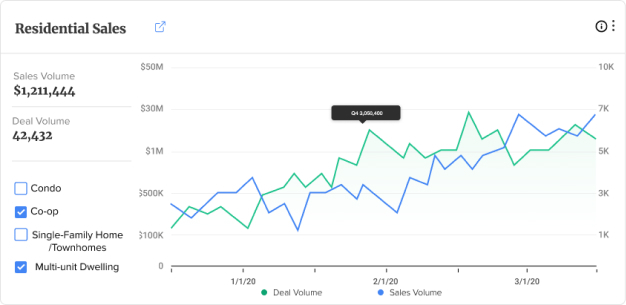Tom Magnani bought two Billionaires’ Row apartments, in 2021 and 2022, for the apparent bargain price of about $300 per square foot.
Later, prices in the same co-op, at 100 West 57th Street, went even lower. Joseph Nelesen paid just $217 per square foot for unit 19K in 2023. Last year, Tatiana Panchenkova snapped up an 1,800-square-foot pad on the 17th floor for $450,000, or $250 per square foot, and paid $141 per foot for another one.
The prices were low for a reason: The co-op, called Carnegie House, does not own the ground beneath it. Instead, it pays rent to the land owners, David Werner Real Estate and Rubin Schron’s Cammeby’s International Group. When the ground lease resets this year, co-op shareholders’ monthly dues will shoot up.
That shouldn’t be a problem for the three buyers. Magnani and Panchenkova both live in $3 million homes in Greenwich, and Nelesen has a $1 million waterfront home, also in Connecticut, property records show. And they can rent out their Carnegie House units for a pretty penny.
Now, however, unit owners at this and about 100 other co-ops with ground leases (see map below) want the government to make their investments even more profitable. They are pushing a bill in the state legislature that would impose a version of rent control on their ground leases, instantly devaluing the land and inflating the value of the apartments above.
It’s a transfer of wealth from ground owners to unit owners. One beneficiary would be the Georgetown Company, which owns the retail space at the base of Carnegie House. The firm hired a lobbyist for $7,500 a month to push the bill.
The residential unit owners have a lobbyist too, as do shareholders at at least one other building. Schron and Werner also have a team of lobbyists, strategists and lawyers.
Create an account to continue

The measure was approved this month by the Senate Judiciary Committee in a dramatic 10-9 vote, despite sustained opposition by the real estate industry, which says the government should not step in to rewrite private contracts.
That argument may have persuaded Sen. Luis Sepúlveda, who dropped his sponsorship of the measure and voted against it. Sepúlveda’s office declined to say why he reversed his position. The bill passed the same committee last year but stalled in the Assembly, a scenario that is now repeating.
Backers of the legislation say it is needed to prevent large increases in monthly dues that would force some longtime owners to sell. But in aiding those folks at the expense of land owners, it would deliver a windfall for investors like the three Connecticut homeowners.
“Having the government come in and rewrite contracts is a very dangerous thing”
“That’s one of the criticisms of the bill,” said attorney Geoffrey Mazel, who represents co-op boards. “You could have bought low. If you bought [a unit] for $400,000, and the bill passes and now it’s worth $1 million, you won.”
At least 10 people own two or more units at Carnegie House — an inconvenient fact that undermines a major rationale for the bill, which is to keep people of modest means in their low-cost homes.
The bill would cap annual increases on ground rent at 3 percent or the Consumer Price Index, whichever is greater, and give shareholders the right to renew their ground leases on the same terms for up to 30 years.
“Having the government come in and rewrite contracts is a very dangerous thing,” said Jay Neveloff, a longtime real estate lawyer at Kramer Levin.
Among the effects, Neveloff said, would be to undermine the mortgages on the land under affected buildings. Opponents of the bill have talked about mobilizing lenders to lobby against it.
Mazel often negotiates with ground owners on co-op boards’ behalf. When a rent reset of unknown size is pending, Mazel said, “it’s pretty treacherous.”
“People can’t get mortgages, and it’s a big black hole,” he said. “It’s a poison pill for the building.”
When shareholders see their equity evaporating, they have no reason to sink money into building maintenance, he said.
There is a process, usually involving arbitration, when ground owners and shareholders cannot agree on a rent reset. The parties at Carnegie House, where the $4 million-a-year ground lease expired in March, are in the throes of that now. Shareholders could end up paying $20 million or more annually.
State Sen. Liz Krueger and Assembly member Linda Rosenthal, the bill’s sponsors, say the legislation would bring needed clarity to the process, which Mazel calls “murky” and untested.
If no deal is reached, a co-op is deconverted into a rent-stabilized building, but that has yet to happen — and if it does, Mazel said it is not clear what the initial rents would be. A lawyer on ground owners’ side, Sherwin Belkin, denies there is any ambiguity.
But even Mazel acknowledges that the bill would give co-op boards tremendous leverage in renewal negotiations.
“If the bill passes, it’s game over,” he said. “The shareholders would not have a need to revise their lease.”
Read more

Judge throws out Carnegie House suit, forcing ground lease negotiations

Billionaires’ Row residents fight for their ground lease co-ops

For ground lease co-ops, expiration could mean decimation


